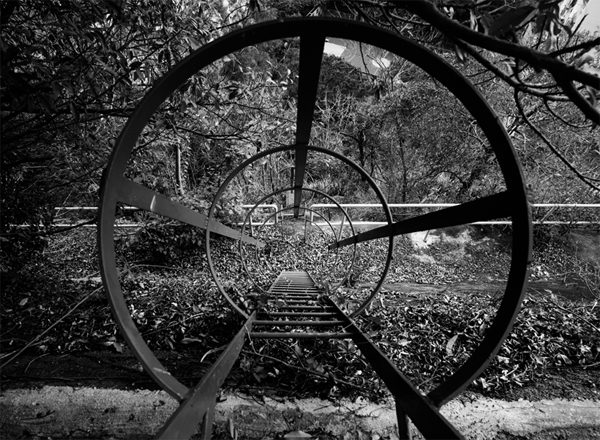What next?
By Dr. Nick Webber

Walking around some of the more peculiar bits of Shek Kip Mei the other day, a friend and I found ourselves trapped at the base of a 100-foot, hillside ladder. In front of us was an imposing, prison-issue concrete wall with two rusted-shut iron doors; behind us was a sodding great ladder covered in stinging leaves and bird shit. We’d braved the ladder in the mistaken belief that it was a shortcut to the Pak Tin Estate, a soon-to-be-condemned public housing development not far from City University. A fair enough hypothesis, perhaps, but one that failed to reckon with an ACME™-style concrete palisade left behind by some huckster, 1950s wall-merchant with beady eyes. Faced with such an impediment, our choices were limited. Starting a new life by the wall didn’t seem practical, scaling it seemed improbable, and smashing it down with our bare hands and brute strength would have legal implications. So we laddered it out of there.
~
I completed my Ph.D. at the back end of last year, and was forced to confront a long-suppressed decision regarding what I wanted to do thereafter. For some, this isn’t even a decision, of course. But then I’d never really seen doctoral research as a vocational endeavour; I just thought it’d be good fun. And aside from the odd stress-meltdown, that’s exactly what it was.
Much less fun, though, was the decision as to whether or not to leave academia and try something else. There’s a great deal written about the potential (dis)merits of having a Ph.D. when it comes to choosing a “career path”. Inside academia, competition for jobs is such that even with the best will in the world, some folks just won’t make it (or will make it in such a way that food stamps are required); and outside academia, Ph.D. graduates are regarded by most HR managers as jumped-up layabouts who’ll eff off at the first whiff of a mortar-board. And more pressing still is the sense in which these paths appear more or less mutually exclusive: follow the academic line, and you become less employable elsewhere over time; seek a job outside academia, and you’ve got 12 months or so to get back in (a fact that always brings to mind Homer Simpson crawling through a hatch labelled “supplicants” when reapplying for his old job at the power plant).
This is not to say that the situation should necessarily be otherwise than it is—aside, perhaps, from the food stamps. With so many (terrifyingly) driven Ph.D. students out there, what reason is there for the system to reward prevarication? And why wouldn’t an HR manager look to favour someone with ten years’ corporate experience over an expert on, say, portmanteau words? But it is to say that it’s precisely these issues that make the post-Ph.D. decision-making process quite so thorny.
And this is without taking into account a rather more psychological facet: namely, the sense in which leaving academia feels to a certain extent like a failing. Thomas H. Benton’s only half-serious Chronicle article, “Is Graduate School a Cult?”, makes the point that academia exhibits cultish traits, and that to leave, to seek gainful employment elsewhere, is to commit academic apostasy. Benton is, of course, writing (with a fair amount of whimsy) from a markedly different academic climate than at HKU (where, for the record, I was only audited a handful of times, and was assured each time that the videocamera had been switched off). But I can certainly attest to the fact that even in the most supportive of environments (and HKU was most certainly that), the idea of leaving academia behind aroused—spoiler alert—a curious emotional hotchpotch of guilt and anxiety. But p’raps that’s just me.
Whether I made the correct decision to ladder it out of academia remains, perhaps, to be seen. I loved my time in the School of English, and I miss my 11 a.m. starts enormously. But then in many ways I’m glad to be left with this emotional residue. It’d be far sadder, after all, to not care either way, to remain indifferent to the intellectual and spiritual effects of Ph.D. study. If I was any kind of literary scholar, of course, I’d end here with some pithy, encapsulating quote, like the obvious Tennyson one, only better, more obscure. Sadly, though, I’m too busy sucking on the corporate teat to remember anything other than The Bottom Line, and you’re all too “brainwashed” to care anyway …
Dr. Webber is the former editor-in-chief of the Alumni Magazine and currently works as a senior editor for BBC Worldwide.

Our apologies, you must be logged in to post a comment.